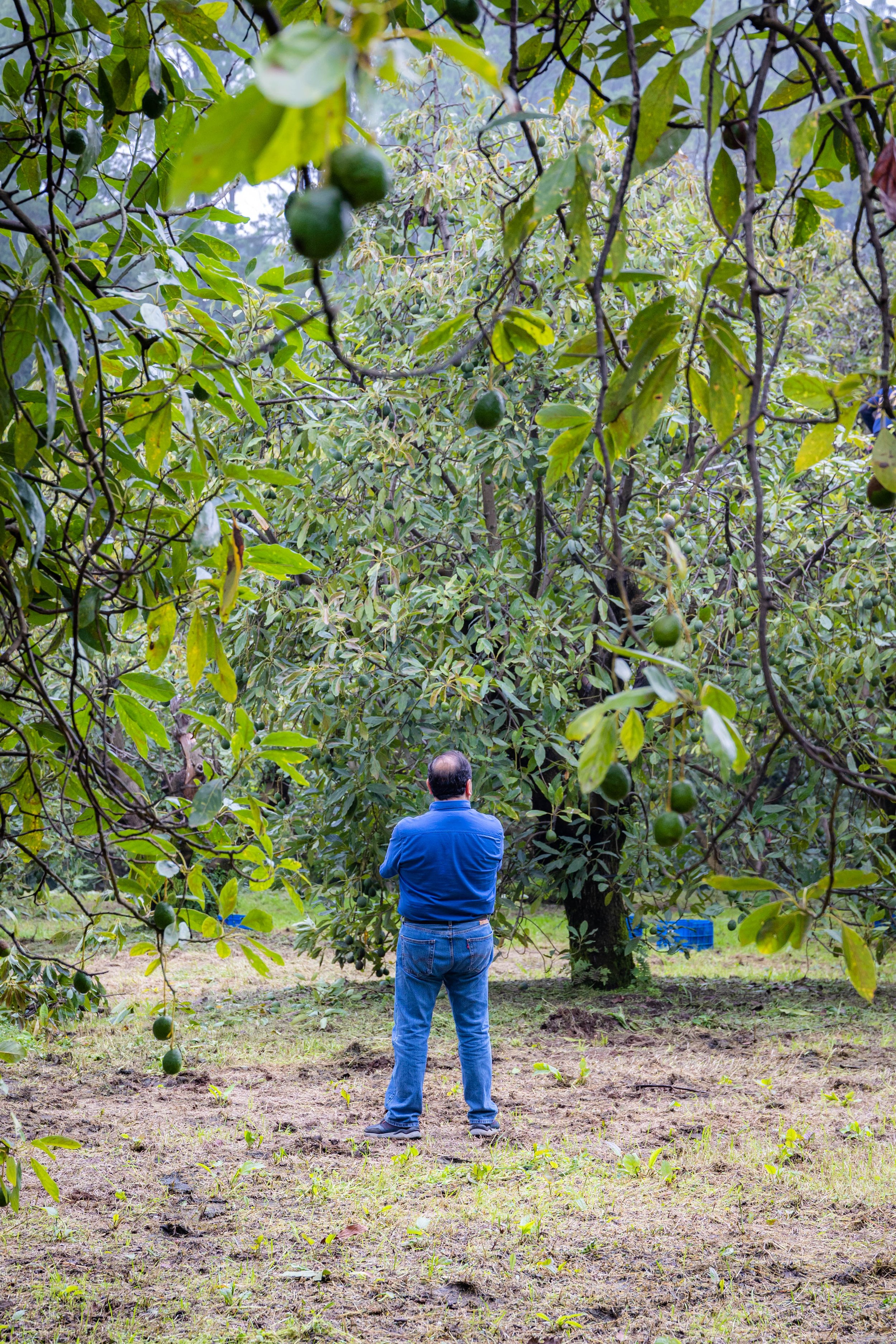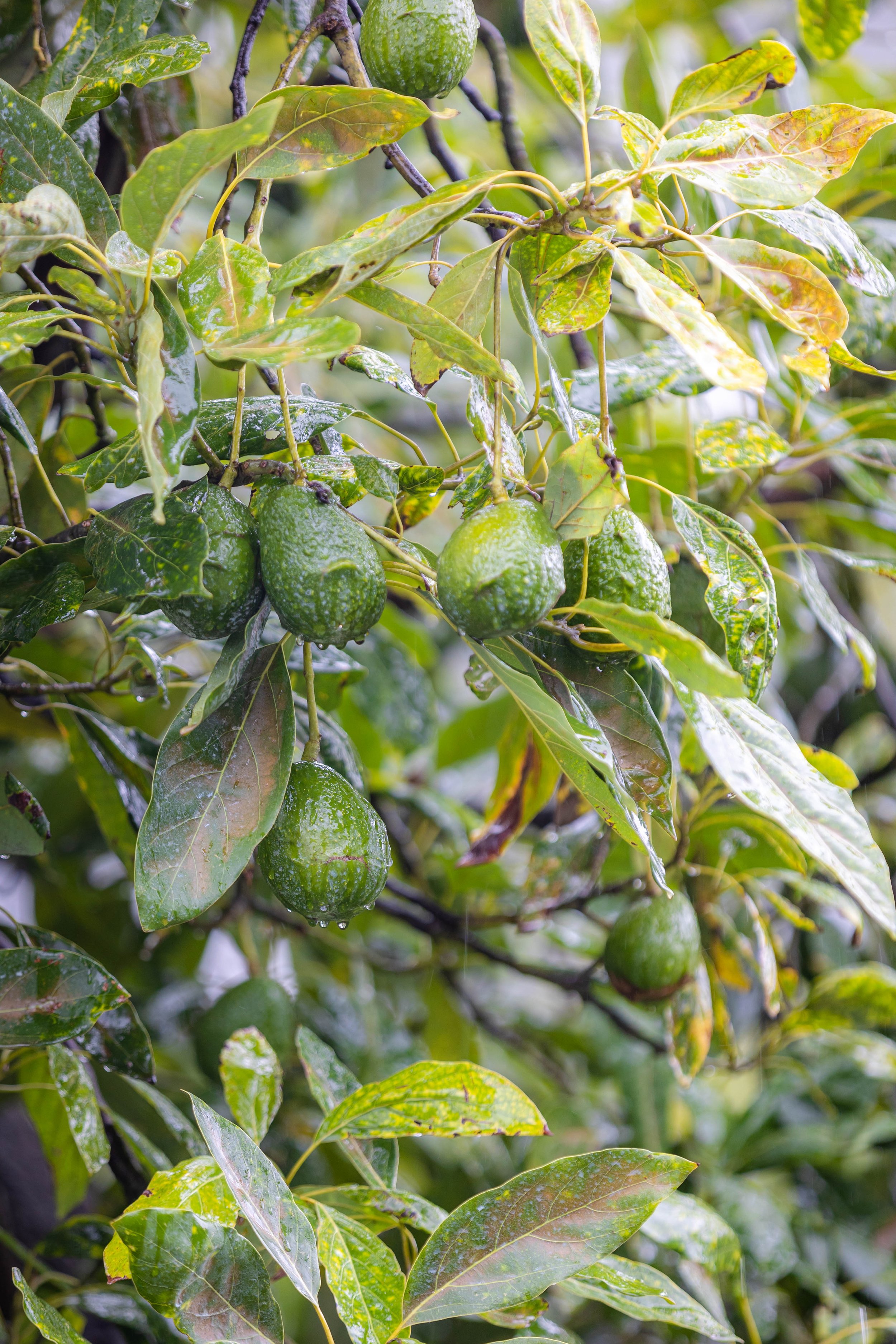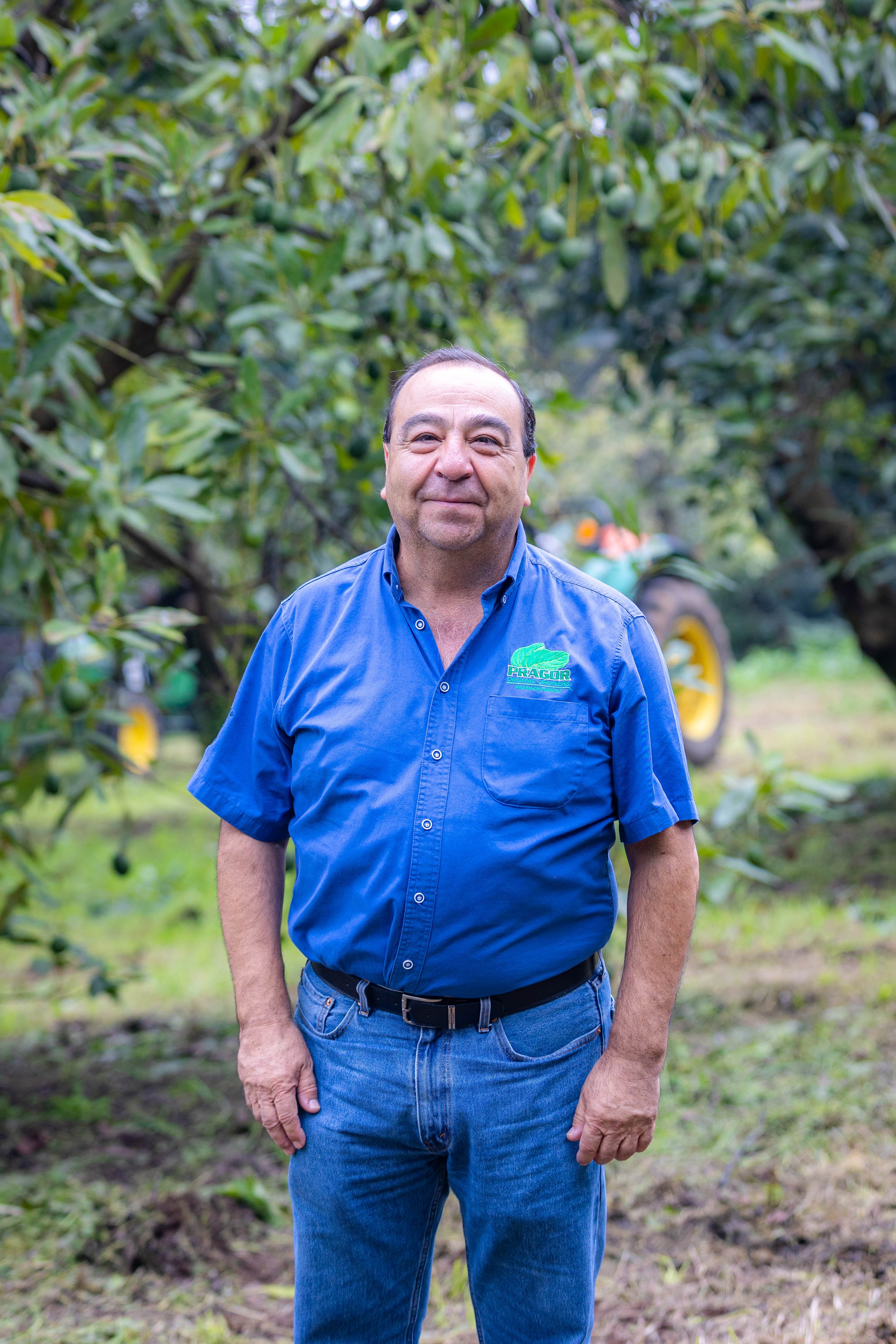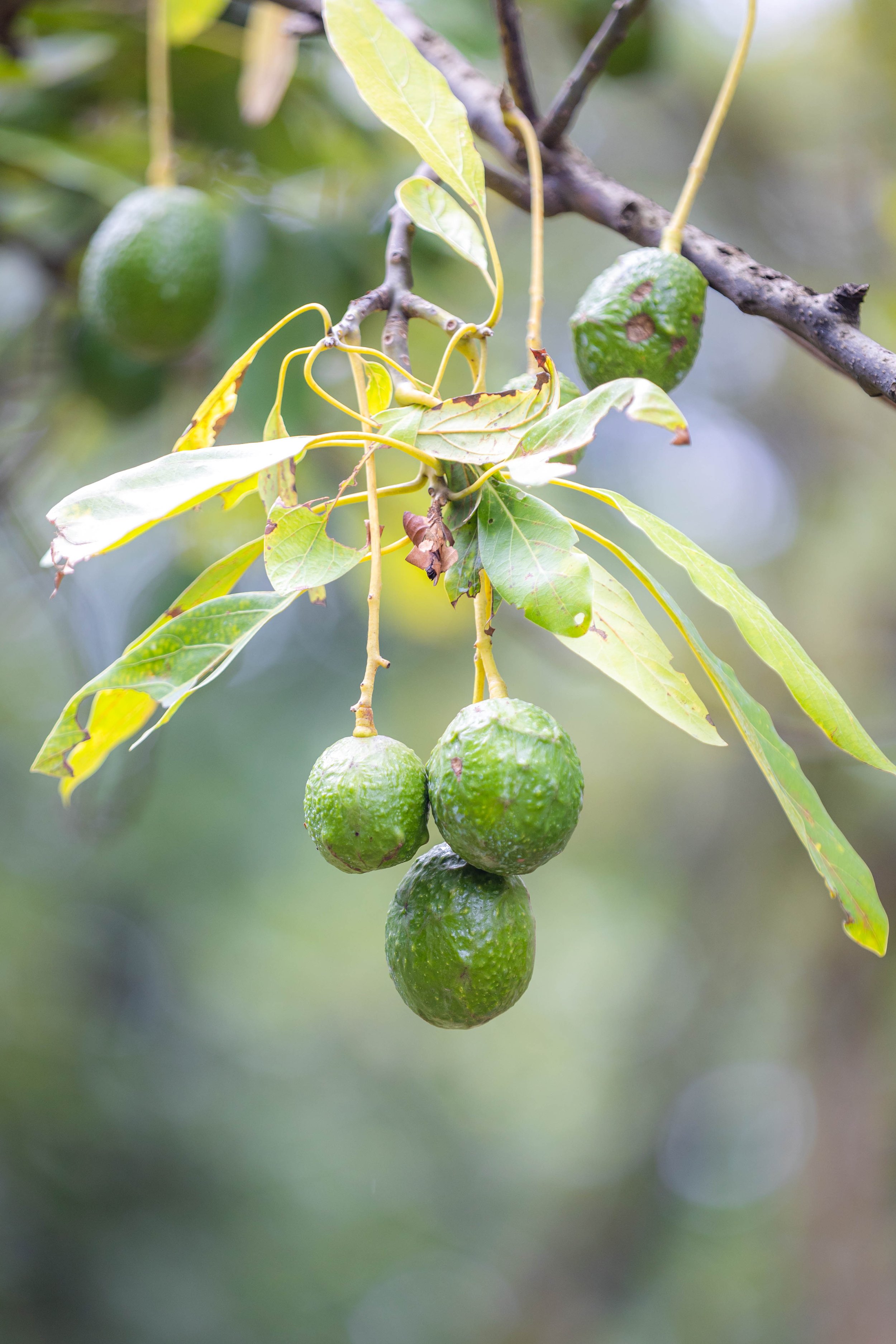Current Challenges for Small-Scale Avocado Farmers in Michoacán
Above left: PRAGOR’s President, Don Gustavo, in a moment of reflection on his farm in Michoacán. Above right: Close-up of avocados in the whole tree.
By Jake Streeck, Equal Exchange Avocado Supply Chain Coordinator
At Equal Exchange, we take pride in our model of truly responsible sourcing that promotes economic justice, environmental sustainability, and community development in regions where our products are grown. Despite the efforts made to cultivate positive change, however, there are certain macro-level issues that continue to impact our sourcing partners and their communities. For avocado farming co-operatives PRAGOR and Integradora Vics—our partners in the state of Michoacán, Mexico—the most pressing challenges include falling sales prices amid rising input costs, market rigidity in US stores, and the negative effects of climate change. This article will elaborate on these obstacles from the viewpoint of the farmers themselves and outline what is being done to help them push forward.
Falling sales prices, rising input costs
Following the intensification of cultivation in established producing countries like Peru and the emergence of new international players like Kenya, global annual avocado output reached a new high of 8.4 million metric tons in 2022.¹ The sharp increase in supply, exacerbated by a rise in market saturation by large corporations,² has imposed severely negative pressure on the prices paid to generational small-scale farmers. Juan, a long-time member of PRAGOR, states bluntly, “Here, we do feel a very big discrepancy between the prices in previous seasons and the prices [this last] season.” His associate Emmanuel elaborates, “The price is low because, above all, there is overproduction of avocado in the state of Michoacán… and what’s more, the state of Jalisco has started to export, and I believe the state of México is about to enter [the export market]. As such, we will have more competition.” Evidently, this expansion in Mexico accompanies extraordinary recent export growth in other countries—to the tune of, in the examples above, a massive 22% in Peru and 15% in Kenya.³
In cruel contradiction to falling sales prices, inflation has caused the cost of production to skyrocket. Since the COVID-19 pandemic, and with further issues now resulting from climate change, it comes as no surprise that rates across most supply chains have been driven up significantly. Emmanuel explains, “This past year, input costs were extremely high. It was very complicated for us to fertilize our orchards as we’d like to because [input costs] rose, I believe, about 100%—in some cases more.” Juan, another member of PRAGOR, warns that across the industry, the “pricing discrepancy will bring about a difference in the quality of fruit that will get delivered.” He reasons that some producers in Michoacán, out of necessity upon seeing their profits lowered, may begin to leave out more costly practices known to improve output.
While there is no doubt that our farmer partners have been impacted by falling prices and rising costs, their cooperative sales methods paired with EE’s good-faith purchasing model are key to mitigating the most negative effects. Vics member Francisco exclaims that before joining the co-op, “It was a matter of searching and searching for who would give the best price. Some [packhouses] wouldn’t even look us in the eye, no. Now… we’re seeing that the price is a fair, agreed upon price.” PRAGOR’s José says, “What can be sold [to EE] gets sold, and the rest… PRAGOR tries to send it to the best places where we can get the most profits. That’s a benefit that we wouldn’t have if we weren’t in a co-operative.” In other words, EE offers a consistent sales outlet, and even when there’s surplus product to be sold, co-operatives grant farmers more pricing leverage than an individual would have alone in the local market. Yet another benefit, as pointed out by Francisco, is that the co-operatives provide low-cost organic inputs for farmers to use in their orchards. This detail highlights the importance of EE’s Fairtrade premium payments of $1.356 per box of avocados (up to $7k per week), which generate funds for the co-ops to develop inexpensive, environmentally friendly inputs that directly help to offset inflated costs.
Rigid market demand
You, the reader—as a likely consumer yourself—are probably aware of your own preferences as to the size of avocados you purchase at the store. But what you may not have considered is that mass consumer rigidity in this regard can greatly hinder processes for the producers at origin, who find themselves caught between strict market dictates and the varied harvests that nature provides them. Hector, now a one-year member of Integradora Vics, illustrates, “We produce avocados of all sizes, and there’s times that [US consumers] look poorly upon the big ones or the small ones, and then we have to sell them [to local packhouses].” To his point, EE’s internal data reveals that our end consumers overwhelmingly select mid-sized avocados, with the lack of demand for ‘shoulder’ (bigger or smaller) sizes leading to desperately low prices for the latter. Francisco reiterates, “You can’t control what the fields give you, what the ground gives you. That comes with the seasons… It limits us a lot [that certain sizes aren’t accepted].”
Percentage of Equal Exchange Avocados sold, by size, in 2022-2023
In addition to size specifications, the US market has shown a distinct distaste for what we in the industry call “Category II” avocados—ones that display blemishes on the surface (ridges, scars, misshaping, sunburn, etc.) but do not exhibit any tangible quality-related defects. We’ll let this 2017 write-up by former PRAGOR member Rafael do the explaining:
“[The US market] is stricter, and will only accept fruit that looks perfect. When we harvest, we get all types of avocados: perfect ones, ugly ones, small ones, big ones… It’s all part of Mother Nature. But from all those types, we can only send the perfect ones. That leaves us with a lot of product that we can’t sell. This makes me sad because the fruit is high quality, and we put a lot of effort into harvesting that fruit, and many times we end up losing money… I would like if they gave an opportunity to the imperfect fruit that, even though it may be at a lower price, is still of the same high quality.”
Though we at Equal Exchange can’t physically pick out fruit for end consumers at the store, we can at least use mediums like this article to educate them (“you”, if you’re a customer) about the positive impacts that certain shopping decisions have on our farmer partners. Since last year, if you’re indeed one of our customers, you also may have noticed EE avocados for sale in ReadyCycle™ boxes. Each containing four “84s” (small avos), these attractive bulk packages have proven to be an effective method of drawing attention to this often-neglected size of fruit.
Moving forward, toward the end of this month, you’ll see additional in-store materials like pamphlets and posters near EE avo displays. As part of our “Whole Tree Initiative” to promote the purchase of avocados of all sizes and appearances, these materials will serve as an interactive way to remind consumers of the power of choice within international food systems.
Above left: PRAGOR’s President, Don Gustavo. Above right: Smaller avocados growing from branches in Michoacán.
Climate change
Like inflation, climate change is a borderless phenomenon that has affected our producing partners at origin just as much as it has altered daily life in the US. That said, the effects are all but uniform. For example, while hurricanes began battering the Atlantic extra early this year,⁴ PRAGOR and Vics—located near Mexico’s Pacific coast—reported an unseasonable lack of rainfall. In an interview in May, Hector of Vics expressed, “It’s been a month and not a single drop of water has fallen… so we’re not going to have so much production.” PRAGOR’s José echoes, “Climate change this year is hitting us hard, and each time it gets accentuated more… Now, no water is falling for us to start nourishing our trees, so the trees are stressed. There are [some] that have their fruit becoming dehydrated.” Around the time of these interviews, both producer co-ops warned the EE team that the lack of rain would diminish volumes specifically for larger sizes of avocados in the coming season. To date in October, even with the return of rainfall over the last couple of months, this trend has yet to be remediated.
Unpredictable and elevated temperatures are another climate issue that significantly impacts avocado production in Michoacán. Gustavo, PRAGOR’s president who still cultivates on his own farm, explains, “This year, there has been a climb in temperatures and this causes the fruit to come out damaged.” He continues, “The climate was more stable before, but now, it is cold in the morning, hot in the afternoon, and we still don’t know what the [total] effect of these drastic changes will be.” Citing the unprecedented heat, Gustavo says some farmers in the region have begun relocating to higher altitudes to maintain production. Those who remain below, including PRAGOR members, are seeing a need to utilize medications to help pollinating bees survive this new normal. One more adaptive cost, underlined by Francisco of Vics, is the rise in wages paid to laborers who now require extra compensation on account of heat-induced discomforts.
As a global challenge, climate change is not something that can be fixed by a small group of farmers. Nonetheless, EE’s partner co-operatives are certainly taking the right steps to confront it. By fulfilling requirements as USDA-certified organic producers, members have proven their dedication to resource conservation and the well-being of regional ecosystems. Both co-operatives, as cited earlier, also use Fairtrade premium payments from EE to develop low-cost, sustainable farming inputs. PRAGOR, furthermore, has undertaken a beekeeping project that promotes local ecological health while bolstering output. This is not to mention their anti-deforestation policy that prevents the entrance of new members whose farms have been in operation for less than five years. Gustavo sums up the co-operatives’ stance perfectly: “We are in a difficult time, but we face it as a group… We have to know how to work as a team and analyze climate change [in order to combat it].”
Conclusion
By buying Equal Exchange products, shoppers demonstrate commitment to a more just reality for small-scale farmers, ecosystems, and communities around the world. But despite the changemaking efforts made possible by these purchases, EE’s producing partners like PRAGOR and Vics are still susceptible to large-scale events such as pricing and costing volatility, market rigidity, and climate change. In the face of adversity, by communicating with our partners, we take steps to identify and tackle these challenges—whether in the form of nuanced models of commerce, consumer education, or innovative mechanisms to confront environmental degradation.
References
Ramírez, Sebastian. “Global Avocado Industry: A Decade of Growth.” FreshFruitPortal.Com, Fresh Fruit Portal, 11 May 2023, www.freshfruitportal.com/news/2023/05/11/global-avocado-industry-a-decade-of-growth/.
Denvir, Audrey, et al. “Ecological and Human Dimensions of Avocado Expansion in México: Towards Supply-Chain Sustainability.” Ambio, vol. 51, no. 1, 18 Mar. 2021, https://doi.org/10.1007/s13280-021-01538-6.
^Ramírez
“NOAA Releases Updated 2023 Atlantic Hurricane Season Outlook.” National Environmental Satellite, Data, and Information Service, National Oceanic and Atmospheric Administration, 11 Aug. 2023, www.nesdis.noaa.gov/news/noaa-releases-updated-2023-atlantic-hurricane-season-outlook#:~:text=The%202023%20Atlantic%20hurricane%20season,pressure%20system%20north%20of%20Bermuda.






